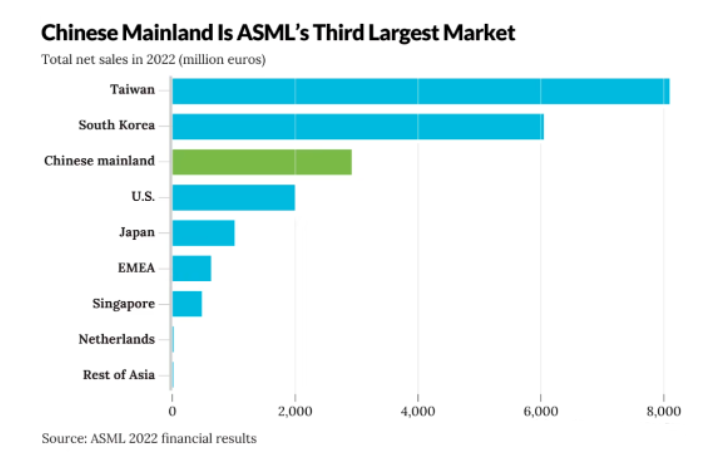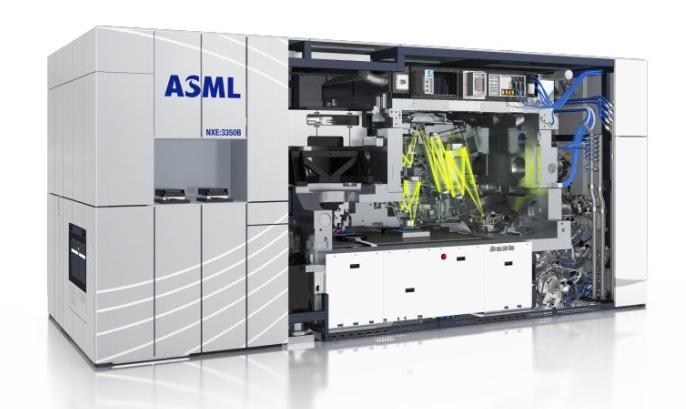Demand in the terminal market is sluggish. It has recently been reported that TSMC will announce a reduction in capital expenditure this year, which may impact ASML and Applied Materials and other equipment manufacturers’ shipments. It is even reported that ASML’s extreme ultraviolet (EUV) machine has been However, the industry generally believes that the possibility is not high, because the EUV machine delivery period is as long as 12 to 15 months, and EUV production capacity is still in short supply in the medium and long term.
Asmore is expected to hold a corporate briefing on the 19th, and is expected to explain changes in the backlog of EUV exposure machines. The semiconductor production chain is still undergoing inventory adjustments. It is reported that TSMC may lower its annual capital expenditure in the corporate briefing, and the memory plant will slow down its production expansion plan, which will lead to a reduction or delay in orders for EUV exposure machines. Affected by this news, EUV concept stocks are obviously under pressure.
However, people in the industry have doubts about the news that the EUV exposure machine has been canceled. The main reason is that EUV equipment is a customized production, and the delivery period of the equipment system is as long as 12 to 15 months, so the purchase of EUV machines is a medium-to-long term. The production capacity planning will not cut orders due to short-term business cycle fluctuations.
Taking the current mainstream numerical aperture (NA) of 0.33 as an example, the average EUV mask layer per wafer for the 5nm logic process exceeds 10 layers, but the average EUV mask layer per wafer for the 3nm logic process will double to about 20 layers Above, the hourly wafer throughput (throughput) of EUV machines has increased slowly. With the introduction of mass production of the 3nm process, more machines are needed to cope with the increase in production capacity and the shrinking of the process. The overall EUV production capacity is still in short supply.
According to the industry, the short-term economic cycle impacts the capital expenditure of semiconductor factories, but TSMC, Intel, Samsung and other major manufacturers have not reduced their investment in advanced manufacturing processes, so the delivery time of EUV exposure machines has not been shortened due to recent economic changes. At present, the industry generally believes that the market will recover slowly in the second half of the year and will enter a new growth cycle next year, so it is unlikely to cut orders for EUV machines at this point in time.
ASML was slashed by a major customer for the first time, which may reach 40%!
Late last year, TSMC faced falling demand for its computer and smartphone components, some of which are produced using fairly modern technological processes involving the use of EUV equipment, as the deterioration in the semiconductor industry also affected foundries. According to Taiwanese media DigiTimes, TSMC is now seriously considering reducing the number of EUV lithography equipment ordered from ASML.
According to reports, the order reduction can reach 40%, which will be the first time in the history of cooperation between TSMC and ASML in the direction of EUV lithography. As an alternative, ASML is considering delaying the supply of equipment that TSMC now desperately needs. In fact, the latter option is preferable to ASML, as the company has to wait in long lines to fulfill orders and will only redistribute equipment originally intended for TSMC to other customers. At the same time, loss of income will certainly be avoided.
According to a report by Korea IT Times, TSMC’s sales in March this year were NT$145.48 billion, or about 6.3 trillion won, down 15.4% from the same month last year. This is the first time TSMC’s monthly sales have declined since May 2019. That was down 10.9 percent from February and the lowest monthly sales in 17 months since October 2021 when it recorded NT$134.539 billion.
Taiwanese industry players predict that Taiwan’s semiconductor industry will be bleak for a long time this year. Pointing out that the downturn in other fabless and design companies in Taiwan will affect TSMC. Taiwan’s Business Times quoted US sources as saying, “The reduction in orders from MediaTek, Taiwan’s third largest semiconductor company, will have a negative impact on TSMC.” He said. Taking Apple as an example, it is expected that demand will increase due to the launch of new products after May, but it is unlikely that TSMC’s capacity utilization rate will recover temporarily, because China’s Xiaomi, Transsion, Nvidia, Qualcomm, and Intel are all in a state of suspension. Reduce order. As profits turn downward, TSMC is expected to seriously adjust the pace of investment. According to Taiwan’s IT media “Digi Times”, TSMC is considering a plan to postpone the construction of a new plant in Taiwan by 6 to 12 months. In addition, this year’s facilities investment (CAPEX) target may also be lowered.
While the United States, the Netherlands and Japan together almost monopolize the global market for chip equipment, Chinese companies are among their biggest customers. For ASML, mainland China was the company’s third-largest market last year, accounting for 13.8 percent of its net sales of 21.1 billion euros ($22.9 billion).
ASML: Originally planned to ship 60 EUV lithography machines this year
Roger Dassen, ASML’s chief financial officer, told Korea Economic Daily in an interview in February, “We have five EUV system customers… We are ramping up our EUV system capacity due to strong demand. As we did in January this year We plan to ship about 60 EUV systems (and about 375 DUV systems) in 2023, as announced in our fourth quarter fiscal 2022 financial results presentation in May.” Previously, it was producing about 40 a year, producing one EUV scanners take about two years and cost $150 million to $200 million per device.
“During our Investor Day last November, we confirmed capacity plans for 600 DUV (deep ultraviolet), 90 EUV systems by 2025-2026, and 20 EUV high-NA systems by 2027-2028.” Thus, We are significantly expanding our capacity to meet demand. Looking ahead to 2023, there is still a lot of uncertainty in the market due to a range of global macro concerns about inflation, rising interest rates, recession and the geopolitical environment, including export controls. “
“Clients are still seeing soft demand in consumer-driven end markets, most notably PCs and smartphones, with some signs of softness or lower growth rates in data center demand, while demand in other end markets such as automotive and industrial remains strong. But Overall, demand for our systems remains strong. This year, demand is still exceeding our capacity and we entered the year with a backlog of EUR 40.4 billion, so our focus will remain on maximizing system output. We Having had several quarters of very strong bookings, the backlog now covers well beyond 2023, which is almost double the expected system sales in 2023.”
ASML increases investment in Taiwan to develop 2nm
Earlier, according to a report by the Central News Agency, ASML invested heavily in Taiwan and applied for an A+ enterprise R&D subsidy from the “Ministry of Economic Affairs” of Taiwan for the R&D and manufacturing of 2nm wafer optical measurement equipment. Taiwan’s “Ministry of Economic Affairs” stated that it will conduct two-dimensional review, including how to assist the supply chain technology upgrade and the local self-made rate, and the final decision will be made in May at the earliest.
ASML announced last year to expand its investment in Taiwan. New Taipei Mayor Hou Youyi revealed that it is expected to settle in Linkou, with an investment of NT$30 billion in the first phase and about 2,000 employees.
Not only to expand investment in Taiwan, ASML also submitted an application to the Ministry of Economic Affairs last year to propose a research and development subsidy plan for 2nm wafer optical measurement equipment. 50%.
“Ministry of Economic Affairs” officials said that the focus of the review is how to improve local technology and local self-made rate; at present, the supply chain of Taiwanese factories has the ability to manufacture masks for transmission modules in deep ultraviolet (DUV) equipment. Including the wafer transfer module, it is expected to be introduced into the local supply chain.
Officials from the “Ministry of Economic Affairs” pointed out that in fact, ASML’s mask transfer modules were moved to Taiwan for manufacturing, making Taiwan the world’s only manufacturing base for ASML’s DUV mask transfer modules, driving Taiwan’s factories to promote and standardize With the growth of supply chain manufacturers such as Heshenyong, through the expansion of investment and R&D by foreign businessmen in Taiwan, they will continue to upgrade the local supply chain technology.
ASML’s application will enter the second stage of substantive examination. The Ministry of Economic Affairs official said that it is estimated that the final review meeting will be held in May and the subsidy amount of the Ministry of Economic Affairs will be clarified.
The Ministry of Economic Affairs’ “A+ Enterprise Innovation R&D Chain Quenching Plan” subsidizes enterprises to invest in innovative R&D and forward-looking industrial technology development. The annual budget is about NT$2 billion. It plans to attract international major manufacturers to come to Taiwan for R&D and production, and at the same time help the island industry enter the front-end equipment supply chain.
Since ASML established a subsidiary in Hsinchu in 2003, it has grown together with Taiwanese manufacturers such as TSMC, and Taiwan has become the only manufacturing base in the world for DUV mask transfer modules. ASML’s upcoming investment project this year will be the largest investment in Taiwan in the company’s history.
Post time: Apr-20-2023


